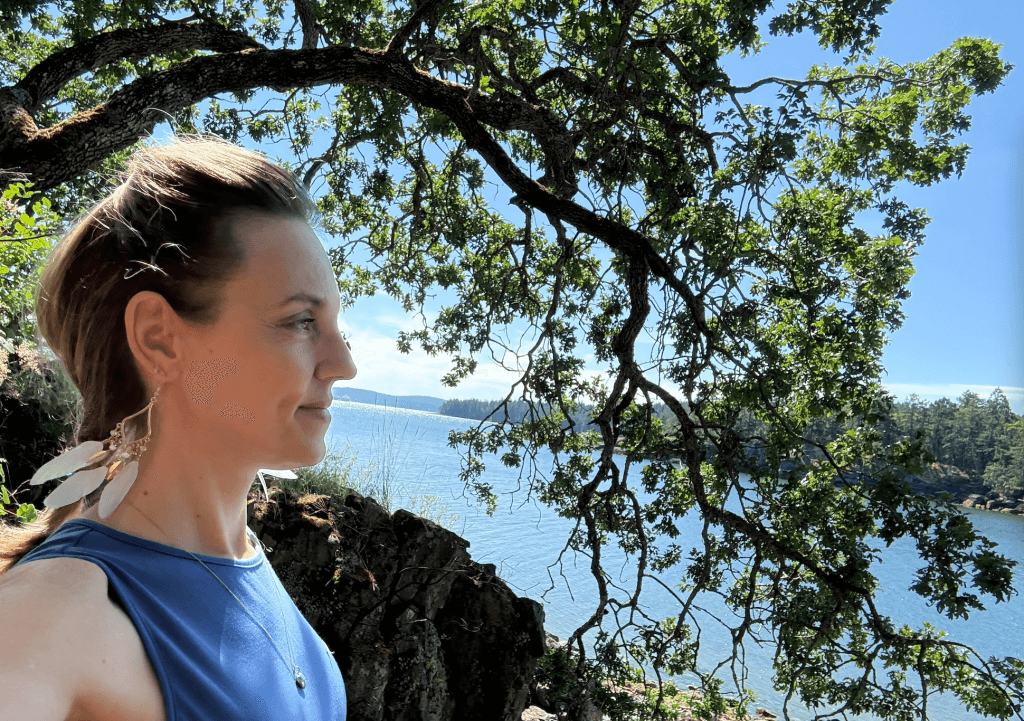Interviewing Melissa ~ Aman Gill Show 2020
Living on a beautiful island, surrounded by ocean views and forest silence, can feel like a sanctuary—but even in the most serene places, mental illness and disability are present. No community is untouched. In my work as a community social worker, I meet people every day who are navigating complex challenges—many quietly, many alone. The natural beauty around us may offer healing, but it doesn’t erase the deep realities many live with. This truth became deeply personal for me through the loss of a loved one to suicide after a long struggle with schizophrenia. It’s a grief that shaped me—and a story I carry into the way I walk through the world and offer support to others.
Losing a loved one is always painful, but losing them to a battle with mental illness like schizophrenia and suicide is an ache unlike any other. It’s a loss tangled in questions, guilt, and the haunting awareness of how devastating mental health struggles can be. For those left behind, grief is compounded by a labyrinth of emotions that make the healing process uniquely challenging.
This blog is both an acknowledgment of this pain and a gentle offering of understanding for anyone walking this difficult path.
The Dual Battle of Schizophrenia and Suicide
Schizophrenia is a complex mental health condition that often feels like an unrelenting storm in the lives it touches. For the person living with it, reality can become fragmented, and relationships often strain under the weight of its symptoms. For their loved ones, it can feel like you’re constantly fighting an invisible foe—desperately trying to protect someone from a battle they didn’t choose.
When suicide enters this story, it leaves behind a unique kind of heartbreak. It’s not just the loss of a person but the loss of hope, the unanswered questions of “what more could I have done?” and the lingering fear that they were alone in their final moments.
Navigating the Grief
The journey through grief after losing someone to schizophrenia and suicide is deeply personal, but certain common themes emerge:
1. The Weight of Guilt and Helplessness
It’s natural to replay conversations, missed opportunities, or signs you might have overlooked. But it’s important to remember: you did what you could with the knowledge and resources you had at the time. Schizophrenia is a powerful, often unpredictable condition. Blaming yourself for their loss will only deepen the pain without changing the outcome.
What can help:
- Speak with a counselor or support group specializing in suicide loss or mental illness.
- Write down your feelings, including your guilt, and gradually work through the idea of self-forgiveness.
2. The Loneliness of Stigma
Mental illness and suicide are still deeply stigmatized, which can make grieving feel isolating. You may feel hesitant to share the circumstances of your loved one’s death, worried about judgment or misunderstanding from others.
What can help:
- Surround yourself with trusted friends who will listen without judgment.
- Join a support group where you can connect with others who understand the unique challenges of losing someone to mental illness.
3. The Unanswered Questions
One of the hardest parts of this kind of loss is the “why.” Why did this happen? Why couldn’t they see how loved they were? Why couldn’t I stop it? These questions can loop endlessly, making healing feel impossible.
What can help:
- Accept that some questions may never have answers. It’s okay to not have closure on everything.
- Focus instead on the memories of your loved one’s life—the moments when they laughed, loved, and lived fully, despite their struggles.
Honoring Their Memory
It’s easy to feel consumed by the tragedy of your loved one’s death, but their life was more than their illness. Finding ways to honor their memory can be a powerful part of healing.
Ideas for honoring your loved one:
- Create a Memory Project: Compile their photos, letters, or belongings into a scrapbook or digital project.
- Support Mental Health Initiatives: Volunteer, donate, or raise awareness for organizations working to support those with schizophrenia or prevent suicide.
- Plant a Tree or Garden: A living memorial can be a comforting way to reflect on their life.
- Write About Them: Share their story—both the joys and the challenges—with others, breaking the stigma around mental illness and suicide.
Seeking Support
Grieving a loss like this isn’t something you should do alone. Professional therapists, grief counselors, and support groups can provide a safe space to process your feelings and begin to heal.
Here are a few resources you might find helpful:
- National Alliance on Mental Illness (NAMI): Offers resources for families and individuals affected by schizophrenia.
- American Foundation for Suicide Prevention (AFSP): Provides support for those grieving a suicide loss.
- Local Support Groups: Many communities have groups specifically for survivors of suicide loss.
Finding Community on Vancouver Island
One thing I’ve learned is that healing doesn’t happen in isolation. For those facing mental illness, supporting a loved one, or grieving a loss, community is vital. Vancouver Island is home to many incredible organizations that provide support, connection, and hope for those in need.
Here are some local resources that have made a difference in my work and could be a lifeline for anyone facing similar struggles:
Mental Health Support
Canadian Mental Health Association (CMHA) Mid Island Branch
Offers counseling, workshops, and peer support programs for those dealing with mental health challenges.
Website: www.cmhabc.caIsland Health Mental Health and Substance Use Services
Provides assessments, crisis intervention, and ongoing support for individuals with mental health and addiction concerns.
Website: www.islandhealth.caVancouver Island Crisis Society
Offers a 24/7 crisis line, suicide prevention programs, and education about mental health.
Crisis Line: 1-888-494-3888
Website: www.vicrisis.ca
Suicide Prevention and Grief Support
Survivor Support Groups (Vancouver Island Crisis Society)
Specific groups for individuals grieving a loss due to suicide, providing a safe space to share and heal.BC Bereavement Helpline
Provides emotional support and information for those grieving a loss.
Helpline: 1-877-779-2223
Website: www.bcbh.ca
Support for Developmental Disabilities
Inclusion BC (Local Chapters)
Works to create inclusive communities and provide resources for individuals with developmental disabilities and their families.
Website: www.inclusionbc.orgCommunity Living BC (CLBC)
Offers services and supports for adults with developmental disabilities, including housing, job coaching, and community connections.
Website: www.communitylivingbc.ca
General Family Support
- Family Caregivers of BC
Provides education, resources, and emotional support for caregivers navigating mental health or developmental disabilities in their loved ones.
Website: www.familycaregiversbc.ca
Finding Light Again
It’s okay to feel overwhelmed, broken, or lost after such a devastating loss. Healing will take time, and there’s no “right” way to grieve. What matters is that you keep going—one small step at a time.
Remember, your loved one’s life, though marked by hardship, had meaning and value. Their story can be part of the greater effort to shine a light on mental illness and the need for compassion, understanding, and support.
And as you heal, let this thought guide you: it’s okay to remember them with sadness, but also with love, warmth, and gratitude for the moments you shared and for everything they teach you before and after their loss.
What I’ve Learned
Writing this blog has been part of my healing. Sharing my love for Vancouver Island alongside stories of my brother has shown me how interconnected joy and grief can be. By opening up about my experiences, I hope to help others feel less alone in their struggles—and to remind everyone that resources and support exist.
If you or someone you know is struggling with mental health, developmental disabilities, or grief, please reach out to one of the organizations listed above. Healing happens when we lean on each other, and I believe we’re stronger together.









